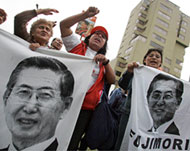Peru seeks Fujimori’s extradition
Peru has asked Chile to extradite fugitive Alberto Fujimori, the former Peruvian president, and to keep an eye on him while they process the request.

Fujimori, wanted in Peru on charges of human-rights abuses and corruption during his 1990-2000 rule, arrived in Chile on November 6 and was arrested a day later.
Fujimori fled to his ancestral homeland Japan in 2000 after a massive corruption scandal toppled his government. He says he plans to run again for president in Peru‘s April election.
“Today the government received, in conformance with a 1932 extradition treaty, a request from Peru for the extradition of Alberto Fujimori,” Chilean Foreign Relations Minister Ignacio Walker said on Tuesday.
Fujimori’s spokesman Carlos Raffo said the former president – who is credited with stamping out Peru‘s Shining Path (a Maoist Peruvian revolutionary organisation founded in 1970) in the early 1990s and ending hyperinflation – would seek his release from a police jail in Santiago now that the extradition request had been submitted.
Diplomatic protocol
But Peru emphasised in its extradition request the risks of releasing the ex-president at this stage in the proceedings because he could flee the country, rights observers said.
For the extradition request to proceed, Peru, in addition to fulfilling diplomatic protocol, must prove that its evidence is not politically motivated and that it is sufficient to launch a criminal prosecution in Chile.
 |
|
Though a wanted man, Fujimori |
A Peruvian military airplane delivered 12 boxes of files weighing 90 kg in support of the request. They contained evidence in 10 cases of corruption and two of the most serious human-rights abuse allegations against Fujimori, including authorising death squads.
Fujimori, who remains popular among Peru‘s poor, denies any wrongdoing and says he is a victim of political persecution.
“It is clear that Peru has presented a huge amount of evidence to the courts in Chile,” said Sebastian Brett, a researcher with the group Human Rights Watch.
“We are actually quite optimistic that the Peruvians have produced some solid evidence in these cases.”
Peru confident
Peru also said it was confident of achieving Fujimori’s extradition, although legal experts said it could be as long as a year before there is a decision.
As courts weigh what to do with Fujimori, they will consider whether he is a flight risk and how much freedom he can be given.
|
“We are actually quite optimistic that the Peruvians have produced some solid evidence in these cases” Sebastian Brett, |
Included among the options are that Fujimori be released on bail, continue to be held in a facility in Santiago, or be placed under house arrest.
Fujimori had hoped that moving to Chile from Japan could help him launch a political comeback.
Analysts say that a person in Fujimori’s position would also calculate that he is likely to get fair treatment in Chile‘s court system, which is known as one of the most independent in the region.
Peru‘s Congress has barred Fujimori from political office until 2011 because he faces criminal charges.